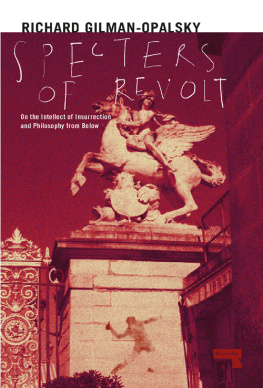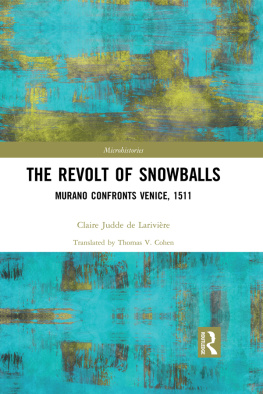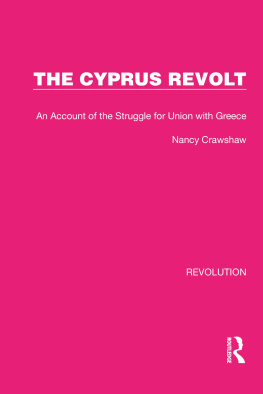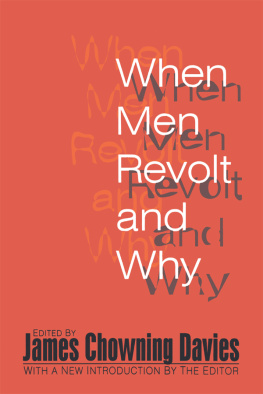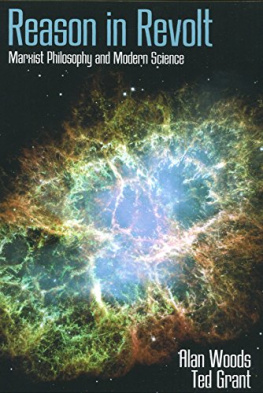Specters of revolt
Specters of Revolt
On the Intellect of Insurrection
and Philosophy from Below
Richard Gilman-Opalsky
Published by Repeater Books
An imprint of Watkins Media Ltd
1921 Cecil Court
London
WC2N 4EZ
UK
www.repeaterbooks.com
A Repeater Books paperback original 2016
Copyright Richard Gilman-Opalsky 2016
Richard Gilman-Opalsky asserts the moral right to be identified as the author of this work.
Cover design: Johnny Bull
Typography and typesetting: Jan Middendorp
Typefaces: Chaparral Pro, Absara Sans
Printed in Finland
ISBN : 978-1-910924-36-5
Ebook ISBN : 978-1-910924-37-2
All rights reserved. No part of this publication may be reproduced, stored in a retrieval system, or transmitted, in any form or by any means, electronic, mechanical, photocopying, recording or otherwise, without the prior permission of the publishers.
This book is sold subject to the condition that it shall not, by way of trade or otherwise, be lent, re-sold, hired out or otherwise circulated without the publishers prior consent in any form of binding or cover other than that in which it is published and without a similar condition including this condition being imposed on the subsequent purchaser.
For Robyn, for the love and companionship.
For Roscoe, for the laughter and imagination.
For Ramsey, for the sweetness and joy.
CONTENTS
INTRODUCTION
Its Always Antebellum
The word antebellum presents an interesting idea. The words particular historical reference is to the period in the southern US before the American Civil War, but its general etymology refers to the time before war. Technically, ante means before and bellum means war. Human history reveals every time as a time before war. It is even antebellum during wartime the present war is never the last war. The war to end all wars has never happened. Whenever there has not been war, or when one is taking place, a future war remains somewhere on the horizon. Thus, times of peace cannot be called postbellum, because there is no after war, only before war. The postbellum may function as a utopian touchstone, a thing that has its uses. Whereas, antebellum captures the sense of a present situation about to be changed by some imminent conflict. For those who dream of a peaceful world, this represents a cynical view, or perhaps, just a view held true so far.
But shifting from war to other modes of conflict and other forms of fighting, this same notion turns optimistic and hopeful. Some formulation like the following captures the point well: If we are not now rising up for something better, we will be. This book is not about war, but revolt.
Happily, there are other ways of contesting reality and relations of power than with the militaries of governments. This book explores and develops the premise that human hope, revolutionary imaginations, creativity, and critique for however long theyre in abeyance are always eventually liberated and activated in moments of revolt. Of course, this premise will have to be borne out, and basic terms like revolt, revolution, and critique need much defining.
But entertaining the premise, for the introductory time being, we might think of every moment in between revolt as a time before revolt. Perhaps, instead of antebellum, we may speak of anterivolta. Like war, revolt against the existing state of affairs also keeps on occurring, yet more than war, revolt embodies and reflects the transformative aspirations of everyday people. Whereas wars waged by states embody and reflect the interests of power and capital, which usually coincide. Inasmuch as revolt comes back, in new forms, in different places, with different stakes and demands, periods of relative passivity, times of quiet, are haunted by the specter of revolt, just as peacetime is haunted by the specter of war.
The title of this book, Specters of Revolt, intends an allusion to two major thinkers separated by a century: First, the title alludes to Karl Marx, who happily announced in The Communist Manifesto, that A specter is haunting Europe the specter of Communism. In the 21st century that began in the 1990s, a new hegemony emerged around the conclusion that Marx was now irrelevant, proven wrong, and responsible (even if indirectly) for some of the worst catastrophes the world had known. Against the ascendant post-Cold War opinion, Derrida insists that Marxism
is still necessary but provided it be transformed and adapted to new conditions and to a new thinking of the ideological, provided it be made to analyze the new articulation of techno-economic casualties and of religious ghosts, the dependent condition of the juridical at the service of socio-economic powers or States that are themselves never totally independent with regard to capital [but there is no longer, there never was just capital, nor capitalism in the singular, but capitalisms plural whether state or private, real or symbolic, always linked to spectral forces or rather capitalizations whose antagonisms are irreducible].
This transformation and this opening up of Marxism are in con formity with what we were calling a moment ago the spirit of Marxism.
Derrida is here insisting that Marxism was not killed in the Cold War, but rather, it is awaiting its next iteration, against previous orthodoxies and forms and for an analysis of the changing present. He acknowledges that the ongoing re-articulation of Marxs critical analysis of capital is a defining part of Marxism itself, which began shortly after Marxs death with all forms of rethinking the critique of capital and power in ways beyond both the imagination and the life and times of Marx himself.
Derrida observed:
Capitalist societies can always heave a sigh of relief and say to themselves: communism is finished since the collapse of the totalitarianisms of the twentieth century and not only is it finished, but it did not take place, it was only a ghost. They do no more than disavow the undeniable itself: a ghost never dies, it remains always to come and to come-back.
Considered in terms of a communist logos (as opposed to a communist government), we might say that if there is anything sensible in the idea of communism, in its opposition to capitalist society, then the communist logos cannot be killed by collapsed regimes. Inasmuch as Marxism continues to express and address real disaffections about real deficits in present society and everyday life, capitalist societies will never be rid of it, no matter how much they might like to deny its existence, to proclaim its death.
Derridas overarching argument is that, while the 20th century seemed to vindicate Marxs claim from the 19th century that the world was haunted by the ghost of communism, the 21st would yet continue to be haunted by Marx in spectral forms to be determined, to be reconsidered. Bringing the two together, I claim that both communism and Marx do haunt and will continue to haunt the 21st century in particular ways that this book will take up directly in its course. However, the ghosts are neither clearly communist nor Marxist all (or even most) of the time. I suggest a broader framework regarding specters of revolt, which give rise to communist and Marxist hauntings, but also, which haunt the world with other ideas about autonomy, everyday life, anxiety, experience, knowledge, and possibility, in ways that often include but are quite clearly not limited to Marxian and communist discourses, no matter how transformed.
Next page
